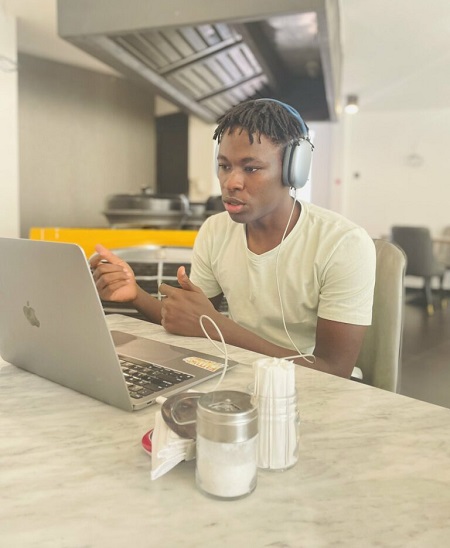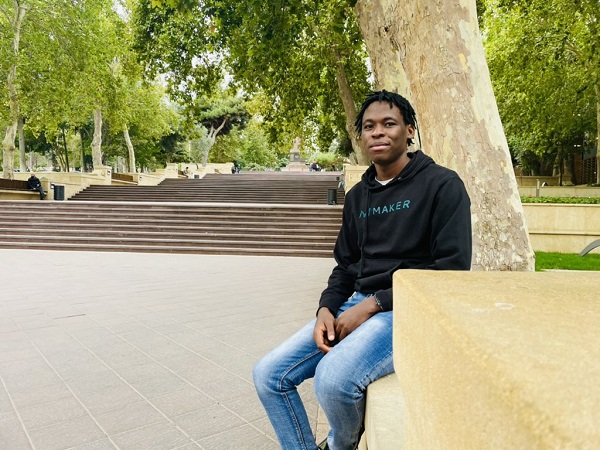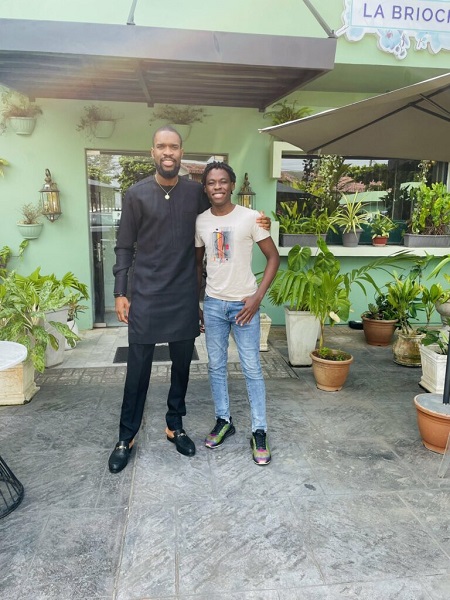[ad_1]
Before meeting Emmanuel Njoku, I wasn’t sure of what to expect. All I could say about him was that he was this young lad building an innovative startup and was famous in the Nigerian tech industry. Now he was on the other end of a virtual meeting, dressed in his usual simple round neck T-shirt. He seemed like a regular tech bro. But I knew there was more to him.
Our meeting started with formal pleasantries, and it was time for him to talk about his background. Njoku would then casually narrate one of the most impressive work resumes I had ever heard. His rich work experience with some of the biggest blockchain companies on the planet strengthened the argument that he is one of the best blockchain engineers on the continent. And now, we were about to discuss his startup, Lazerpay. His confident tone, sturdy resumé and depth of reasoning and communication made it easy to forget that he was only 19 years old.
The birth of Lazerpay
At the peak of his career, Njoku conceived of starting Lazerpay after a botched attempt to donate to a charity organisation. “While in Dubai, I worked about four jobs, and all of them paid me in crypto. So I never had any fiat,” Njoku said. “I wanted to donate $250 to a charity organisation back in Nigeria. But I’ve always looked for the “pay with crypto” option on any website. In this case, I could use Coinbase commerce. But my payment failed, and my money was taken. I tried contacting Coinbase’s customer support, but there was too much going back and forth, and it was a horrible experience. I ended up losing that money,” he said.
Njoku soon discovered he wasn’t alone. It was a popular experience with crypto payments. Njoku saw his opportunity after speaking with a friend, Akinyemi Akindele, who worked for Binance then (now the founder of BetDemand). Njoku narrated how it was easy for Akindele to mention African fintech companies focused on easing payments for merchants but knew none that did the same with crypto. Njoku realised how big the market was and decided to solve that problem. That solution today is Lazerpay.
Lazerpay, a crypto payment gateway startup Njoku co-founded with Abdulfatai Suleiman and Prosper Ubi, was launched in October 2021. Since then, it has received a lot of praise as a necessary innovation that can accelerate crypto adoption in Africa. Lazerpay is not only solving payments for businesses but also provides them with easy access to decentralised finance (DeFi) features such as lending and staking.
“Our traditional currencies weren’t built to solve cross-border payments,” Njoku said. “The naira won’t work outside Nigeria; the cedi won’t work outside Ghana. It’s the same thing everywhere. Crypto is the only solution that really works right now.”
Njoku would then passionately describe the problem his startup is solving, making sure I understood it by using relatable contexts and scenarios. His desire for simplicity was clear. He wanted to remove every complexity that accompanies the blockchain subject for every user. It’s no surprise that Lazerpay’s whitepaper is arguably one of the simplest ones written by a web3 company. It takes a level of genius to make complex things look simple, and Njoku seems to be great at doing that. He would still have been impressive if he were a 30-year-old. But he isn’t – he’s 19. Finding out how he got this far at such a young age was only the right thing to do. And it turns out he wasn’t an overnight success.
From a blindfold to a dream
In 2015, Njoku’s aunt, a robotics engineer, visited the family home in the oil-rich city of Port Harcourt, Rivers State. She introduced Njoku and his siblings to the basics of computer programming using a blindfolding game. “She’d ask us to play a game. We would be in a room, blindfolded, and our goal was to reach the door. She’ll then verbally guide us to that door. ‘Take 10 steps forward, turn 45 degrees right’, etc.,” Njoku said. “That’s how we understood the way computers processed programs. They follow instructions. So if they aren’t giving you the results you want, it’s your fault, not the computer. Computer no dey lie (computers don’t tell lies).” That was the inception of Njoku’s quest to become a software engineer. While in his third year in secondary school (JSS3), he began his coding journey.
Luckily, his father is a telecoms engineer. So he began to collect learning resources on computer networking and programming from his father’s friends. Njoku was already a math whizz winning medals at Olympiads, so he was smart enough to grasp programming languages.

Becoming Emmanuel Njoku
Ever since he caught the tech bug, Njoku wanted to become Africa’s ‘Mark Zuckerberg’, a seemingly whimsical dream he gladly shared with everyone around him. He got mocked and laughed at for it, but his ambition only grew stronger. He wanted to prove to everyone that his dreams were valid. “I wrote in a book that I wanted to build an operating system like Bill Gates or a social network like Mark Zuckerberg,” he said.
His passion for coding became concerning to his parents, who wanted him to become a doctor, but that didn’t deter him. After acing his secondary school exams, Njoku’s next challenge, surprisingly, was finishing university.
“My parents wanted me to study medicine. That caused problems for us because I wanted to do computer science and software engineering.” Njoku later settled for electrical and electronics engineering at Enugu State University. That, his engineer father could live with. But even while at school, Njoku was bent on fulfilling his dreams of becoming a world-class software engineer. “I only entered the campus to charge my laptop,” he said. “I even used my money for textbooks to buy programming courses on Udemy.” He saw the university as a waste of his time, primarily because there wasn’t anything new for him to learn. “I had done most of those 300level engineering maths and engineering drawings while in SS1 to SS3.”
However, the 2020 pandemic lockdowns became the springboard for Njoku’s ambition. He gladly went back home, knowing he would finally be able to pay full attention to programming and not have to deal with his parents’ dissent. For the next six months, Njoku started coding for up to 12 hours daily. “I did not want to go back to school. But I knew I needed to have some proof of work for my parents to agree.” It was at this time he started taking advanced courses on blockchain engineering.
Njoku’s talent and hustle began to get recognition when he got his first job as a mobile developer during the lockdown. “My first pay was N70,000. It surprised my parents that I could land a job that paid that amount at a time when people were losing their jobs despite having no university degree. I felt on top of the world then.” It didn’t take long for him to land his second job at Hydro Blockchain, which paid him in crypto. “I had learned blockchain engineering as though my life depended on it. That was how I got my first remote job with Hydro blockchain. They paid about $700 in Hydro tokens. I remember how my mum shouted when she saw my first salary. It looked like a dream. She didn’t understand how I was making so much from ‘pressing laptop’ with no degree. I was excited about my pay, but even more so because they finally started believing in my passion. It started making sense to them.”

From Xend to the world
In September 2020, Njoku decided to take his blockchain engineering career a step further. So, he reached out to Ugochukwu Aronu, the co-founder of Xend, the parent company of Quiva Games, where he’d once interned for five months, to check if there was an opening. After sharing what he’d done at Hydro, Aronu invited him to Enugu to join his new venture, Xend Finance, a Google and Binance backed decentralised finance (DeFi) platform for credit unions, cooperatives, and individuals.
Then, the pandemic was already easing up, and students had started going back to school. Aronu made him an offer— N150,000 net salary while on probation, a MacBook, and free accommodation. Njoku showed the job offer to his parents, letting them know he wasn’t going back to school. For the first time, his father consented. “We were finally on the same page,” he said. “The same man that once seized my laptop for not focusing on school agreed with me to not go back.”
Njoku was aware of the cost of his decision. He knew the stakes were higher now that he had dropped out of school. “I gave the job everything I had because it was all I had. I couldn’t afford to lose this job because there was nothing to fall back to. I was not going to start school again,” he said.
It’s noteworthy that Njoku isn’t against education. On the contrary, he credits education for his success. The problem, according to him, was that he wasn’t getting any value from a university education. “Most of the syllabus was outdated. I was learning more from online courses than school,” he said. “You can get educated without the university. In my opinion, if you attended a very good secondary school, you’ve learnt most of the things you need. You’ll breeze through higher institutions.”
Three months after joining Xend, Njoku led the blockchain engineering team. “I just completed the company’s probation period and was already leading the blockchain engineering team. I had to take charge of an entire project in the middle of the building phase. I fixed the bug, wrote, and deployed smart contracts. I even had to help the frontend team because they didn’t know as much about web3 as I did.” He successfully led the team to the product launch in December 2020. However, it was not void of challenges. “I made a deployment error that cost the company $10,000. I got depressed because Ugo (Aronu) told me he would deduct it from my salary. I was like, how much am I earning? It turned out he was just joking, anyway.” At this time, Njoku’s salary had doubled.
In January 2021, Njoku decided to take on the world and start applying to the top blockchain companies. “I checked for the list of the top ten blockchain companies in the world. MakerDAO was number one at that time. I applied to all of them. The worst that could happen was to get a no. Some rejected my application, but MakerDAO got back to me. I applied as a software engineer, but the role was no longer available. Luckily, they needed a blockchain integrations engineer from Africa. We went through screenings, and I got the job.” Thus, at 18, Njoku became the first African and youngest member of MakerDAO’s engineering team, earning over $3,000 monthly. “It was a bit intimidating at first. I was just 18 years and among people with over 15 years of work experience,” he said.
After joining MakerDAO, Njoku started receiving offers from around the world. It had become clear that he was one of the best. “I started getting job offers almost every day,” he said. “It was like MakerDAO had done the heavy lifting of interviewing me, and now others just had to throw job offers at me.” He eventually accepted a contract offer from Instadapp, a DeFi protocol company, for $90 per hour. Njoku resigned from Xend Finance and relocated to Dubai.
While in Dubai, his career took another leap. First, MakerDAO increased his compensation. Then he got a contract offer of $3,000 per week from Avarta, a blockchain security company based in Singapore. He joined them and built their entire blockchain infrastructure. “At this point, I can do anything, whether mobile web, blockchain, or backend, As long as it involves writing codes to make something work.”

LazerPay: The new dream
Njoku then met Yele Bademosi, the founder of Nestcoin, who eventually became his mentor and an early investor in LazerPay. When Bademosi wanted to start Nestcoin, Njoku was one of the first engineers he reached out to.
After Njoku became certain that he had a solution for Africa’s payment sector, he decided to take another bold step. In late 2021, he resigned from his high-paying jobs to focus on his startup. He left MakerDAO in December 2021, while his Maker token worth over $200,000 would have vested by February. He also rejected a salary package worth over $300,000 from Avarta.
LazerPay is not simply an innovative product to Njoku. He regards it as a dream bigger than him. And just like when he made sacrifices to become an engineer, he is aware of the challenges he needs to overcome. “My biggest headache right now is regulations,” he said. “This is Africa, where many governments are not crypto-friendly. Even though the CBN did not outrightly ban crypto but only restricted the use of bank accounts, it’s still a hurdle to convince businesses that they aren’t breaking any rules. And when we go to meet businesses in Kenya or any other country, we have to think of their regulatory environment. Nothing else bothers me like regulation. I even considered launching LazerPay in Dubai to capture markets in India and the Middle East before coming back to Africa. But then I realised that Africa is my home, and we know this market better than anywhere else,” he said.
Emmanuel Njoku has grown from being a sensational young engineer to a founder of one of the most prospective crypto startups on the continent. He still holds that dream of becoming Africa’s Mark Zuckerberg. Whether or not that will happen, he is already writing his name on Africa’s history books.
[ad_2]
Source link

